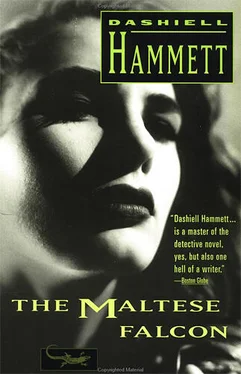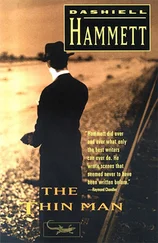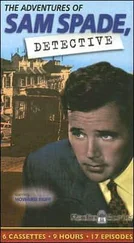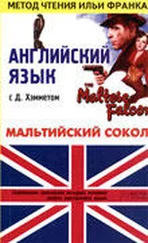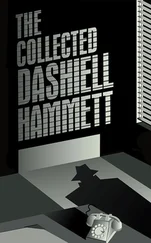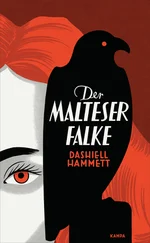The fat man raised his glass, smiled at its emptiness, and rose to fill it and Spade's. "You begin to believe me a little?" he asked as he worked the siphon.
"I haven't said I didn't."
"No," Gutman chuckled. "But how you looked." He sat down, drank generously, and patted his mouth with a white handkerchief. "Well, sir, to hold it safe while pursuing his researches into its history, CharilaoS had re-enamelled the bird, apparently just as it is now. One year to the very day after he had acquired it—that was possibly three months after I'd made him confess to me—I picked up the Times in London and read that his establishment had been burglarized and him murdered. I was in Paris the next day." He shook his head sadly. "The bird was gone. By Gad, sir, I was wild. I didn't believe anybody else knew what it was. I didn't believe he had told anybody but me. A great quantity of stuff had been stolen. That made me think that the thief had simply taken the bird along with the rest of his plunder, not knowing what it was. Because I assure you that a thief who knew its value would not burden himself with anything else—no, sir—at least not anything less than crown jewels."
He shut his eyes and smiled complacently at an inner thought. He opened his eyes and said: "That was seventeen years ago. Well, Sir, it took me seventeen years to locate that bird, but I did it. I wanted it, and I'm not a man that's easily discouraged when he wants something." His smile grew broad. "I wanted it and I found it. I want it and I'm going to have it." He drained his glass, dried his lips again, and returned his handkerchief to his pocket. "I traced it to the home of a Russian general—one Kemidov—in a Constantinople suburb. He didn't know a thing about it. It was nothing but a black enameled figure to him, but his natural contrariness—the natural contrariness of a Russian general—kept him from selling it to me when I made him an offer. Perhaps in my eagerness I was a little unskillful, though not very. I don't know about that. But I did know I wanted it and I was afraid this stupid soldier might begin to investigate his property, might chip off some of the enamel. So I sent some—ah—agents to get it. Well, sir, they got it and I haven't got it." He stood up and carried his empty glass to the table. "But I'm going to get it. Your glass, sir."
"Then the bird doesn't belong to any of you?" Spade asked, "but to a General Kemidov?"
"Belong?" the fat man said jovially. "Well, sir, you might say it belonged to the King of Spain, but I don't see how you can honestly grant anybody else clear title to it—except by right of possession." He clucked. "An article of that value that has passed from hand to hand by such means is clearly the property of whoever can get hold of it."
"Then it's Miss O'Shaughnessy's now?"
"No, sir, except as my agent."
Spade said, "Oh," ironically.
Gutman, looking thoughtfully at the stopper of the whiskey-bottle in his hand, asked: "There's no doubt that she's got it now?"
"Not much."
"Where?"
"I don't know exactly."
The fat man set the bottle on the table with a bang. "But you said you did," he protested.
Spade made a careless gesture with one hand. "I meant to say I know where to get it when the time comes."
The pink bulbs of Gutman's face arranged themselves more happily. "And you do?" he asked.
"Yes."
"Where?"
Spade grinned and said: "Leave that to me. That's my end."
"When?"
"When I'm ready."
The fat man pursed his lips and, smiling with only slight uneasiness, asked: "Mr. Spade, where is Miss O'Shaughnessy now?"
"In my hands, safely tucked away."
Gutman smiled with approval. "Trust you for that, sir," he said. "Well now, sir, before we sit down to talk prices, answer me this: how soon can you—or how soon are you willing to—produce the falcon?"
"A couple of days."
The fat man nodded. "That is satisfactory. We— But I forgot our nourishment." He turned to the table, poured whiskey, squirted charged water into it, set a glass at Spade's elbow and held his own aloft. "Well, sir, here's to a fair bargain and profits large enough for both of us."
They drank. The fat man sat down. Spade asked: "What's your idea of a fair bargain?"
Gutman held his glass up to the light, looked affectionately at it, took another long drink, and said: "I have two proposals to make, sir, and either is fair. Take your choice. I will give you twenty-five thousand dollars when you deliver the falcon to me, and another twenty-five thousand as soon as I get to New York; or I will give you one quarter—twenty-five per cent—of what I realize on the falcon. There you are, sir: an almost immediate fifty thousand dollars or a vastly greater sum within, say, a couple of months."
Spade drank and asked: "How much greater?"
"Vastly," the fat man repeated. "Who knows how much greater? Shall I say a hundred thousand, or a quarter of a million? Will you believe me if I name the sum that seems the probable minimum?"
"Why not?"
The fat man smacked his lips and lowered his voice to a purring murmur. "What would you say, sir, to half a million?"
Spade narrowed his eyes. "Then you think the dinguS is worth two million?"
Gutman smiled serenely. "In your own words, why not?" he asked.
Spade emptied his glass and set it on the table. He put his cigar in his mouth, took it out, looked at it, and put it back in. His yellow-grey eyes were faintly muddy. He said: "That's a hell of a lot of dough."
The fat man agreed: "That's a hell of a lot of dough." He leaned forward and patted Spade's knee. "That is the absolute rock-bottom minimum—or Charilaos Konstantinides was a blithering idiot—and he wasn't."
Spade removed the cigar from his mouth again, frowned at it with distaste, and put it on the smoking-stand. He shut his eyes hard, opened them again. Their muddiness had thickened. He said: "The—the minimum, huh? And the maximum?" An unmistakable sh followed the x in maximum as he said it.
"The maximum?" Gutman held his empty hand out, palm up. "I refuse to guess. You'd think me crazy. I don't know. There's no telling how high it could go, sir, and that's the one and only truth about it."
Spade pulled his sagging lower lip tight against the upper. He shook his head impatiently. A sharp frightened gleam awoke in his eyes—and was smothered by the deepening muddiness. He stood up, helping himself up with his hands on the arms of his chair. He shook his head again and took an uncertain step forward. He laughed thickly and muttered: "God damn you."
Gutman jumped up and pushed his chair back. His fat globes jiggled. His eves w-ere dark holes in an oily pink face.
Spade swung his head from side to side until his dull eyes were pointed at—if not focused un—the door. He took another uncertain step.
The fat man called sharply: "Wilmer!"
A door opened and the boy came in.
Spade took a third step. His face was grey now, with jaw-muscles standing out like tumors under his ears. His legs did not straighten again after his fourth step and his muddy eyes were almost covered by their lids. He took his fifth step.
The boy walked over and stood close to Spade, a little in front of him, but not directly between Spade and the door. The boy's right hand was inside his coat over his heart. The corners of his mouth twitched.
Spade essayed his sixth step.
The boy's leg darted out across Spade's leg, in front. Spade tripped over the interfering leg and crashed face-down on the floor. The boy, keeping his right hand under his coat, looked down at Spade. Spade tried to get up. The boy drew his right foot far back and kicked Spade's temple. The kick rolled Spade over on his side. Once more he tried to get up, could not, and went to sleep.
Читать дальше
